HOME / PROCLAMATION! MAGAZINE / 2012 / SUMMER / PROPHECY SHOW 2012
S U M M E R • 2 0 1 2
VOLUME 13, ISSUE 2

Adventist Revelation seminars are known for their sensational advertising art featuring lurid beasts and prophetic symbols derived from Ellen White's Great Controversy and from current events. This year seminar flyers have featured the ancient Mayan calendar that ended with the year 2012. This year is also significant because the Adventists have designated 2012 as the year during which they plan to distribute 162,000,000 copies of The Great Controversy worldwide. The book has been translated into all the major languages of the world, and some of the versions have been retitled and condensed, but it is still Ellen White's pivotal book that shapes Adventist eschatology and biblical interpretation. We offer Chris Lee's article in order to shed light on the persistent and consistent content and nature of Adventist evangelism.
 The creaky, colorful wagon rattled along in the ruts cut by countless other wagons that had already creaked across the prairie. The weary horse picked up its pace as the clapboard town grew on the horizon, and the driver straightened his lapels, smoothed his hair, and donned his silk top hat with the brilliant red feather tucked in the band. Sharp eyes spotted the wagon's approach, and long before horse and man had reached the town's only street, children were streaming out of the school house to greet the visitor and skip beside the wagon.
The creaky, colorful wagon rattled along in the ruts cut by countless other wagons that had already creaked across the prairie. The weary horse picked up its pace as the clapboard town grew on the horizon, and the driver straightened his lapels, smoothed his hair, and donned his silk top hat with the brilliant red feather tucked in the band. Sharp eyes spotted the wagon's approach, and long before horse and man had reached the town's only street, children were streaming out of the school house to greet the visitor and skip beside the wagon.
It had been a long year in Deadwood, a town without much in the way of entertainment, but finally the Medicine Show was back with its patented miracle elixir! Some called the miracle medicine "snake oil", but that hardly mattered. During the next week the town would gather to see the spectacle as the medicine man sold his wares and entertained the crowd with music, stories, and magic tricks. The Medicine Show was the highlight of the year.
When I was a boy, the Revelation seminars held in the Seventh-day Adventist church in which I grew up were something of an annual highlight. Growing up in a small church in small-town Iowa, I found very little that could be described as "exciting". The Revelation seminars, however, were events I could count on to titillate and even thrill. The traveling evangelists would come to town with their Kodak slide carousels, set up their portable projection screens, and proceed to mesmerize us. In some ways, those events were much like the 19th century traveling "doctors" described above. The traveling medicine shows were, if nothing else, high entertainment in an otherwise mundane existence, and so were the Revelation seminars of my youth.
Thrill of fear
Perhaps this is the place to admit a personal weakness. I've always found that fear produces a delicious, even addictive thrill. I guess that's why I have an affinity for scary movies, even bad ones. I like being scared, and the Revelation seminars really scared me. They always had so many good horror elements; I could count on scary fantastical beasts, an apocalyptic storyline, villainous Sunday-keepers bent on imprisoning and killing Sabbath-keepers, and Satanic conspiracies. The slide show pictures were gripping, the rhetoric urgent and inflammatory, and the carefully arranged Bible verses ominous. Unlike a silly horror movie, however, this stuff convinced me. I bought it all, just like the small town denizens bought the snake oil.
Basically, the progression of the meetings I went to in the 70s and 80s went like this: the first night was usually spent examining various "signs of the end" in the Bible, then tying those signs to (then) current events. The speaker's conclusion would always be that we were at the very end of earth's history. The next night focussed on Nebuchadnezzar's dream of a statue foretelling the progression of world history, again ending with the conclusion that we were living at the very end of time. From Nebuchadnezzar's dream the speaker would move on to demonstrate that the major issue of the end times would be one of true worship after which he would introduce the unique Adventist view of the three angels in Revelation 14 which embraced an 1844 investigative judgment to determine who the true worshipers were. The evangelist would follow this revelation with a call for people to come out of their religious traditions before it was too late.
The next sessions were usually devoted to establishing the centrality of the Ten Commandments to the true worship of God, and then the evangelist's focus would shift to identifying the seventh-day Sabbath as the primary end-time test that would reveal who the true worshipers of God really were. Having identified true worship, the speaker would then introduce a scary end-time scenario involving Catholic-led "Sunday-keepers" persecuting God's true remnant people: "Sabbath-keepers". In this scenario, keeping the Sabbath could result in imprisonment or death. Despite that frightening future, however, those in attendance were exhorted to come over to God's side before it would be forever too late, and they would receive the Mark of the Beast through "Sunday-keeping".
Scary stuff. One had the choice of being on God's side and being put to death, or of being on Satan's and the Pope's side and being eternally lost—all determined by the day on which one chose to worship.
Revelation Today
Since leaving Adventism I've had a few opportunities to discuss my childhood memories of Revelation seminars with current members of the Adventist organization. They have uniformly told me some variant of, "The church doesn't teach that anymore" or "You probably just grew up in one of those little conservative churches that overdid it, but that's not normal". I've wondered many times if those who insist this stuff isn't taught anymore are being entirely honest with me. I now live in what many consider to be a bastion of more progressive Adventism, and yet I still receive fliers for Revelation seminars nearly every year. While several of the seminar series have been held at some of the smaller Adventist churches in town, at least some of these have been held at the large, local, ostensibly progressive college church.
I figured there was only one way to test the claim that Adventism either doesn't teach this cultic material anymore, or that I just experienced an extreme and unrepresentative form of the teaching. I decided to sit in on the 2012 Revelation Today seminars being beamed out to Adventist host sites around the world. The seminars were being presented by a prominent Adventist evangelistic ministry called It is Written. The presenter was an Adventist pastor, the international director of It is Written, John Bradshaw. I went to the Revelation Today website and searched for a host location. There were three host sites and five television stations in my vicinity showing the seminars, including the Adventist cable station, Three Angels Broadcasting Network (3ABN).
In order to better be able to take notes, I opted to view the seminars online where I had the option to pause and back up the video stream. Below is a summary of my notes from 22 nights of the Revelation Today seminars. For brevity, I have not covered every topic covered in the seminars but have attempted to cover the major points. Readers are encouraged to decide for themselves if the Revelation seminars of today are anything like the Revelation seminars of yesteryear—or, for that matter, anything like the traveling medicine shows of the Victorian era.
 New facade, old content
New facade, old content
I am first struck by how far the Revelation seminars have come technologically. Gone are the carousel projectors and retractable screens. They have been replaced by huge projection screens on a stage at the Cashman Center in Las Vegas, Nevada. The screens display the highest quality professional graphics. Among the graphics displayed are easy-to-understand statistical charts and real-time Twitter poll data from the world wide audience. Audiences all over the globe are not only viewing live via satellite and internet but also are interacting directly with the speaker as he requests their input. Revelation Today is well named. It is truly a Revelation seminar for the 21st century. Despite this high-tech gloss, however, the content harkens back to an earlier time.
On the first night Pastor Bradshaw begins by implying that Christians either think they can't understand Revelation or they interpret it poorly. He demonstrates his point by referencing Harold Camping's failed end-of-the-world prophecies of May 21, 2011, and October, 2011. He also makes reference to other failed end-time prophecies elsewhere, but he oddly fails to mention that Adventism was founded on just such a failed prophecy predicting the return of Christ on October 22, 1844. Despite beating up on these failed predictions, he then spends most of the rest of the session using the Bible to prove that we are living in the very last days of earth's history. To be fair, Bradshaw stresses that he isn't setting a specific date, but he is quite emphatic that the end is near. He bolsters his claims with stories and statistics of wars, famines, pestilences, earthquakes, hunger, disease epidemics, droughts, floods, violence, leaps in technology, and false Christs. Bradshaw even names David Koresh as a false Christ, but he fails to note that Koresh and many of his followers had Adventist backgrounds and, as an Adventist offshoot, Koresh's clan shared some of Adventism's apocalyptic themes and prophecies.
The second night deals with what Bradshaw refers to as "The Master Key to Bible Prophecy". Evidently the master key is Nebuchadnezzar's dream of a statue in Daniel 2, although it takes Bradshaw 23 minutes of build-up before he finally reveals this much-hyped "key". The primary purpose of this session is to reinforce his earlier assertion that we are living in the last days of earth's history. In making this point Bradshaw labors through 78 minutes of fluffy filler ranging over such odd topics as tarot cards, psychics, mediums, and the power of prayer. While he spends quite a bit of time spinning an elaborately embellished story around Nebuchadnezzar's dream, there is only the most cursory covering of the actual 45 verses that make up this passage in the Bible.
At the next session our speaker urges us to attend every single day because every presentation builds on the previous one. According to Bradshaw the presentations are like building a beautiful house. While I somewhat agree, I would say the presentations are more like building a house of cards. They look good when assembled, but when you pull out one single card, the whole structure collapses. This collapse is because his teachings have no real biblical foundation. Instead, Bradshaw employes flourishes that make his assertions appear as if they might have a biblical basis, but that apparent foundation doesn't hold up to careful contextual scrutiny.
So how does Bradshaw pull off the illusion of presenting biblical material? This next session is an excellent illustration of a tactic he employs in nearly every other session. First, the series host, Yves Monnier, sets up the illusion by earnestly stating that everything presented will be "straight from the Bible". After a song Bradshaw picks up his Bible, holding it before the crowd like an illusionist showing the inside of his black silk hat just before he reveals a rabbit and says, "It's important for us to get into the Bible," puts it back down, and then goes on to conduct a very leading poll of the audience taken via Twitter. He again picks up his Bible, brandishing it at the audience, and proceeds to tell a story about the Japanese attack on Pearl Harbor. By my count, he follows this pattern over 19 times, never once reading from the Bible, although he frequently glances into his Bible, evidently for notes about his next story or illustration. Adding to the illusion, a large close up picture of a Bible is projected onto one of the two large screens behind him.
 Finally, 27 minutes into the presentation, Bradshaw finally reads a text, but his Bible is little more than a prop. While Bradshaw quotes a bit of Isaiah 14 and Ezekiel 28 in reference to Lucifer, what follows is the story of Lucifer's fall and the fall of Adam and Eve as told by Adventist prophetess Ellen G. White. He presents a multitude of White's details not found in the Bible, such as Lucifer accusing God of being unfair, the "Great Controversy" motif setting up a struggle for preeminence between Lucifer and Michael (who is Jesus in Adventist theology), and Adam and Eve wearing robes of light. With the exception of the heretical Great Controversy theme, the rest of the non-biblical details may seem harmless, but the bottom line is that Bradshaw's claim that everything he teaches comes straight out of the Bible is at best a magician's sleight-of-hand and at worst an outright lie.
Finally, 27 minutes into the presentation, Bradshaw finally reads a text, but his Bible is little more than a prop. While Bradshaw quotes a bit of Isaiah 14 and Ezekiel 28 in reference to Lucifer, what follows is the story of Lucifer's fall and the fall of Adam and Eve as told by Adventist prophetess Ellen G. White. He presents a multitude of White's details not found in the Bible, such as Lucifer accusing God of being unfair, the "Great Controversy" motif setting up a struggle for preeminence between Lucifer and Michael (who is Jesus in Adventist theology), and Adam and Eve wearing robes of light. With the exception of the heretical Great Controversy theme, the rest of the non-biblical details may seem harmless, but the bottom line is that Bradshaw's claim that everything he teaches comes straight out of the Bible is at best a magician's sleight-of-hand and at worst an outright lie.
The audience has had the Bible waved in its direction repeatedly, has seen the Bible projected on large screens, and has observed Bradshaw glancing at the pages. They go away believing they have heard something from Scripture when in reality Bradshaw has shown them just about everything but Scripture. It's an entertaining and well-done trick, but it is only an illusion. The medicine men of yesteryear would be proud.
Nothing much comes out of this presentation other than Bradshaw asserting, "The Bible says, down here in the end of time, worship will be the issue, and Satan will receive the worship of the world." He then sets up future sessions by explaining that the dragon of Revelation is Satan, and he will give the beast his power so he can receive worship through the beast. Bradshaw declines to reveal the beast now, but promises to do so later in the seminar. This is sounding familiar.
Gospel of three angels
At the next meeting, Bradshaw discusses worshiping the beast versus worshiping the Creator. This contrast is billed as the primary theme of Revelation. He talks about overcoming sin in our lives and says that those who are saved in the end will have God's name "written on their foreheads". Bradshaw further says that God's name represents his character and that sin is the barrier to our characters being transformed. This declaration sets the stage for a scary discussion of a judgment of believers' works in a subsequent message.
In a 98 minute marathon of myth, Bradshaw uses Revelation 14:6 as a launching pad to present the Adventist gospel. Bradshaw believes that the "last gospel message" that will go to the world in the end times is what Adventists refer to as "The Three Angels' Messages". Bradshaw states he is stunned that this "gospel" isn't preached from every pulpit around the world. This "last gospel", according to Bradshaw, is referenced in Revelation 14 but explained in Daniel 7.
Bradshaw then sets about making a convoluted case for the founding doctrine of Adventism, the Investigative Judgment. He launches into a bewildering demonstration of random mathematics and proof texting gone awry to demonstrate that Jesus started judging the work of believers in the year 1844. This investigative judgment of works will determine which believers are "ready for Heaven" according to Bradshaw. According to this pillar of Adventist theology, Jesus could finish His work of judging believers' works at any time and return to earth, so there is much focus on being ready and being able to pass the judgment. Bradshaw believes this judgment of believers' works to determine their eternal destiny is revealed in Daniel and proclaimed to the world in Revelation 14, but it doesn't appear to phase him that the judgment referenced in Revelation 14 refers to the judgment of the wicked, not of believers. There is much discussion of the importance of keeping the Decalogue and of "being ready", leaving one with the impression that keeping the Ten Commandments perfectly is the way to pass the investigative judgment.
During a subsequent meeting, Bradshaw effectively removes all doubt regarding the central role that keeping the Decalogue plays in Adventist eschatology. Returning to Revelation 14 he points out that the saints are those who keep God's commandments. In making this point, he inserts the word "ten" where it doesn't exist and ties the keeping of the Ten Commandments to "the everlasting gospel". Before launching into a discourse on each of the Ten Commandments Bradshaw states, "Down in the last days there is a people keeping the commandments of God", but he does not yet reveal just who these people are. Again tying the Decalogue to a supposed judgment of God on believers' works, Bradshaw goes to the book of James and insists that when James talks about "the perfect law of liberty" he is saying that believers will be judged according to the Decalogue. This assertion is despite the context of James' actual message which teaches that mercy triumphs over judgment (Jas. 2:1-13).
Perhaps most concerning is Bradshaw's twisting of the doctrines of salvation and justification before a holy God. In contrast to the biblical teaching that we are able to stand before a holy God because Jesus' righteousness is substituted for our own and is credited to our account as if it were ours, Bradshaw teaches that our only hope of being able to stand before a holy God is if God puts the Ten Commandments into our hearts so that we will be able to meet the standard of judgment in our works. He then goes on to redefine grace as God giving us the power to keep the Law. This non-biblical belief is what Bradshaw defines as "The New Covenant Experience".
What's more, receiving this Adventist "grace" puts a person under an obligation to "vindicate" the One taking a chance on him. A person vindicates God by making the most of this imparted power to obey the law. To illustrate his point, Bradshaw tells a story of a policeman giving him a warning instead of a ticket, after which he felt the need to drive slowly in order to demonstrate that the policeman was justified in letting him off the hook. Essentially he is teaching that God chose to let us off the hook for our past sins, then empowers us to go forward in obedience to the Ten Commandments in order to vindicate God's decision to let us off the hook for our previous failures. This burden of obligation is far different from the real gospel revealed in Scripture, that God did not simply let us off the hook; rather, He paid our debt in full, on our behalf, and adopted us into his family forever, bestowing absolutely unmerited favor upon us and making us His heirs. There is not a hint anywhere in Scripture that God's character needs us to vindicate it. Instead, Scripture emphasizes that it is God's sovereign choice to save us, completely apart from our works.
 Creator or the beast
Creator or the beast
Having established the false gospel of law-keeping as the requirement for salvation, Bradshaw moves on to frame the central issue of end time events as being "creatorship". Basically a person's choices, as explained by Bradshaw, come down to two options: worshiping the dragon (Satan) and his beast, or worshiping the Creator. He then makes the case that the way one shows allegiance to the Creator is by worshiping on Saturday, the seventh-day Sabbath of the Decalogue. Bradshaw believes worship on the seventh-day Sabbath is the message that will go to the whole world before Jesus comes. Everyone, he maintains, will be compelled to make a choice between worshiping God on Saturday or worshipping the beast on some other day.
Bradshaw has the audience now. He has been building to this point over many nights and has played upon common misunderstandings of the law within some segments of Christianity. He knows that many in his audience have been raised believing that the Decalogue is the law under which Christians must live. They have been set up their entire lives for just this moment. Bradshaw demonstrates that the seventh-day Sabbath of the Decalogue has always been Saturday, and the Bible gives no authority to change this fact. He demonstrates that Jesus kept the Sabbath, then attempts to make a case for the apostle Paul keeping the Sabbath. He even implies, repeatedly, that keeping a day other than the day that God blessed after His work of creation is roughly akin to allying yourself with Darwinian evolutionists against the creatorship of God. He pounds home that the Decalogue is not the ten suggestions, but the Ten Commandments, a turn of phrase used by such prominent evangelical preachers as Rick Warren.
This seems too easy. The audience has been preconditioned for the hard sell. Bradshaw tells his audience that according to Revelation, if they really love Jesus, they will keep His commandments, all ten of them, just as they are written. It is now clear who Bradshaw believes God's special commandment-keeping people at the end of time will be: those who worship on Saturday.
In a powerful appeal he tells the audience that they're not responsible for what they didn't know in the past, but now that they have "the truth", they are responsible for the light they have been given. He reminds them that before Jesus comes back everyone will know about the truth of the Sabbath because worshiping on Sabbath is the Everlasting Gospel that the Angel in Revelation brings to the world. He pleads with the audience to honor God by keeping the seventh-day Sabbath, playing upon their emotion and desire to live righteously. He tells them that if Jesus loved them enough to die for them, then surely they can love Him enough to live for him by keeping the Sabbath. He promises it will make them grow closer to Jesus.
He has them now. All that is left is to ramp up the fear factor in the remaining sessions.
Blame the Catholics
In a session entitled "History's Greatest Religious Cover-Up", Bradshaw blames the Roman Catholic Church for attempting to change the Sabbath to Sunday. Moreover, he goes on to identify the little horn of the beast as the Papacy and the beast itself as Catholicism in a session titled "Babylon Rising". In "The United States in Bible Prophecy" Bradshaw makes the case that the United States will ally itself with the Catholic beast to persecute Sabbath-keepers and force people to receive the mark of the beast—which he identifies as worshiping on Sunday, the supposed false worship instituted by the Catholics. Again Bradshaw makes the case that the final test will all come down to worshiping the Creator by worshiping on Saturday, or worshiping the beast by worshiping on Sunday. Therefore, people will be marked as saved or lost by the day on which they choose to worship.
In "The 144,000" Bradshaw claims that God's true people "are identified as a church" in the Bible. He claims that 144,000 is a symbolic number representing a spiritually pure people who haven't been defiled by false teachings. He ties this pure group back to those who are sealed by Sabbath-keeping and have avoided the mark of the beast. It is clear that he believes that the 144,000 are those who embrace the key tenets of Adventism at the end of time. In essence, God's true people are a church, and that church is the Seventh-day Adventist church. He appeals to the audience to become a part of what he terms this "unique" and "elite" group. Of course, the opportunity to be part of an "elite" group is always appealing.
In the "The Scarlet Woman" Bradshaw pushes his attack on Catholicism further, making an emotional appeal for his audience to separate themselves from "Babylon the great, the mother of harlots" (Catholicism and her children, the Protestant churches who supposedly pay tribute to her by worshiping on Sunday). He urges the audience to turn away from the scarlet woman (Catholicism) by rejecting Sunday worship and embracing the Seventh-day Sabbath.
In "The Holy Spirit and the Unpardonable Sin" Bradshaw closes the deal by appealing to his audience not to commit the unpardonable sin by refusing to follow what they have now learned. He appeals for people not to be lost, but to follow the light they have been given. He makes an appeal for members of the audience to come down front indicating they want to be baptized, or re-baptized, and "Stand with a group of people who are keeping the commandments of God." This is the sales pitch, the pay-off after many long nights building to this point. The implication is clear: be baptized as a Seventh-day Adventist now, or risk grieving the Holy Spirit and being lost. And people do go forward. The sale has been made.
Despite the high tech veneer, this Revelation Today seminar surely sounds a lot like the Revelation seminars of yesterday. The delivery is updated, but the content is nearly identical. After spending so many hours immersed in Adventist evangelism, I am still unclear about why so many of my acquaintances claim that this stuff is no longer taught in Adventism or that my youthful experiences were the exception. The seminar I sat through was produced by one of the largest Adventist evangelistic ministries in existence, was broadcast to Adventist host sites all over the world, and was shown on Adventist television channels. To claim its content isn't representative of Adventist belief seems misinformed at best and disingenuous at worst. I would encourage my friends who are still in denial to visit It is Written's Revelation Today website and view the archived seminar for themselves. Snake oil may have gone high tech, but at the end of the day, it's still just snake oil.
Another good run
The wagon creaked its way out of town, the excitement over. The townspeople had been entertained and had handed over their money for the worthless brown bottles of snake oil. The medicine man smiled wryly. It had been a good run, but this town was tapped for now. No matter, there were many more towns across the plains and many more bottles of snake oil to hawk, and besides, he'd be back this way again next year. †
Resources on the web for further study
The following are found on LifeAssuranceMinistries.org:
2. What about the Ten Commandments?
5. Did the Waldenses keep the Sabbath? †

Copyright 2012 Life Assurance Ministries, Inc., Casa Grande, Arizona, USA. All rights reserved. Revised July 2, 2012. Contact email: proclamation@gmail.com
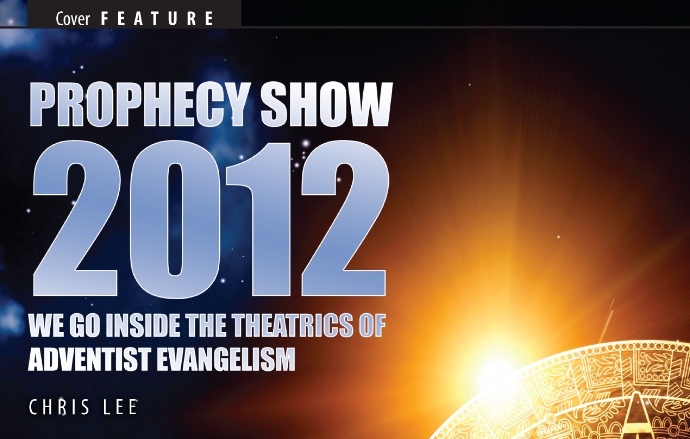
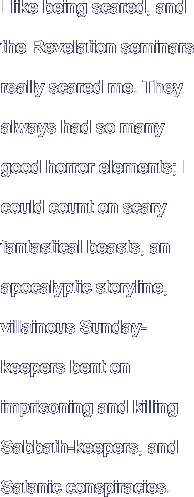
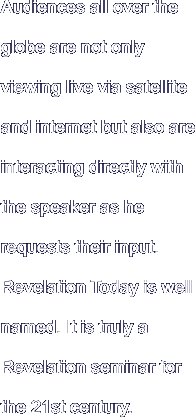
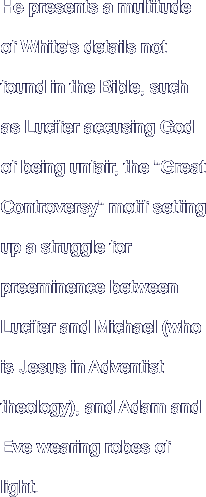
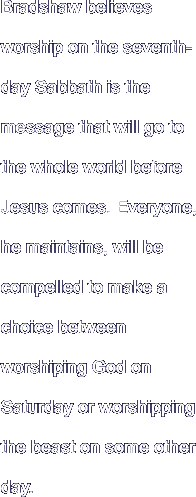
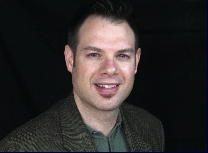 Chris Lee lives in Lincoln, Nebraska with his wife, Carmen, and daughters, Ashlyn and Alyssa. They attend the Lincoln Berean Church. Chris is a self-described "theology junkie" whose mission is to proclaim the unfathomable grace of Christ in a clear, understandable, and Biblical way. Chris is the editor of the Proclamation! Blog at ProclamationMagazine.com. You may contact Chris by email at ambulater@gmail.com.
Chris Lee lives in Lincoln, Nebraska with his wife, Carmen, and daughters, Ashlyn and Alyssa. They attend the Lincoln Berean Church. Chris is a self-described "theology junkie" whose mission is to proclaim the unfathomable grace of Christ in a clear, understandable, and Biblical way. Chris is the editor of the Proclamation! Blog at ProclamationMagazine.com. You may contact Chris by email at ambulater@gmail.com.